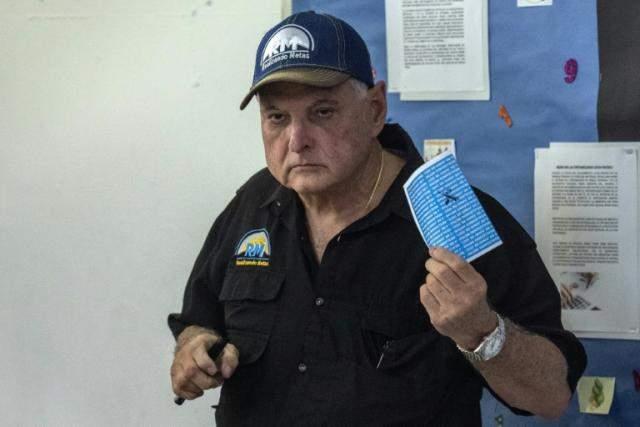
Martinelli's Presidency Bid And Avoiding Jail Is On A Knife Edge
On December 5, the Superior Court for Settlement of Criminal Cases received an extraordinary appeal from the defense of Ricardo Martinelli, who is trying to overthrow the case of money laundering in the purchase of Epasa.
The criminal appeal prepared by jurist Carlos Carrillo, in favor of former president Ricardo Martinelli, points out 29 alleged reasons why the former president's conviction should be“married”, that is, revoked, and the politician should therefore be acquitted by the Second Criminal Chamber of the Supreme Court of Justice.
The extraordinary appeal, 50 pages long, was presented on December 5 to the Superior Court for the Settlement of Criminal Cases. The document is compact and its wording is clear.
The main protagonist of this resource is a procedural notion called“healthy criticism.” This term essentially means the reasoned opinion of the judge hearing a case. This is in contrast to the old system of the so-called“legal rate” by which the evidence of a process was valued according to immutable, fixed, and pre-established criteria.
Argument structure
The narrative that is sought to be constructed in this appeal is that there were 19 occasions in which alleged“errors of law” were committed when evaluating testimonies, expert opinions, and a bank check.
According to this story, Martinelli was convicted because sound criticism was incorrectly applied, giving the wrong evidentiary value to a multiplicity of testimonies, to the expert opinion of Deputy Commissioner Eliseo Ábrego, or to the weighting of a multimillion-dollar corporate check from the former president himself.
The testimonies harmful to the politician's cause were pointed out as inadequately valued by the rules of healthy criticism.
These alleged errors of law led, according to the narrative, to Martinelli's conviction. Among the 19 reasons are included the testimonies of the two protected witnesses, the expert opinion of Deputy Commissioner Eliseo Ábrego and a multiplicity of witnesses that include: Ricardo Chanis; Felipe Alejandro Virzi López; Nicolás Iván Corcione Pérez Balladares; Aaron Ramón Mizrachi Malca; Ramón Carretero Napolitano; Henry Moisés Mizrachi; Gabriel Betesh; Mike Betesh and Danny David Cohen, whose testimonies, according to the appeal, received the value of“full evidence,” but this, according to Carrillo, should not have been because the rules of sound criticism were violated. On the other hand, some testimonies, such as those of Francisco Arias Vallarino and Francisco Arias Galindo, were not given the same treatment and that is why the appeal indicates this was also a violation of sound criticism.
The second group of motivations for the appeal are the so-called“factual errors” and these refer to 10 testimonial and expert evidence that is favorable to Martinelli, and which it is stated were not properly considered. These include the following testimonies: Ricardo Franccolini; Valentín Martínez; Henry Moisés Mizrachi; Moussa Levy and the expert Aníbal Guerrero Urriola. According to the appeal, this evidence in favor of the former president was not adequately considered, since if it had been the case he would not have been convicted.
Contradictions
Although it is usual for the same witness or expert to be used as a basis for more than one reason for an error of law or error of fact in an appeal, it is not usual for there to be contradictions between what is stated in favor of one or the other.
Thus on page 20, when referring to the testimony of Gabriel Betesh, it is noted: "... since he was criminally linked to himself and to his brother Mike Betesh...". To be linked to a crime it is necessary to assume that what is declared is true, so the concern about this detail is striking, given that there was a collaboration agreement that protected these brothers.
Another contradiction occurs on page 46 when referring to the defense expert Aníbal Guerrero Urriola, it is pointed out:“... that there was no record, stock book or shareholder minutes of the company Editora Panamá América SA (Epasa) and of Tpahc Inc. SA since they had not been delivered to the aforementioned companies.” This is stated as a favorable argument when on page 9 the deputy commissioner expert Eliseo Ábrego was questioned when it was stated that his expert opinion had deficiencies because the official said:“... not having examined a single accounting or accounting record. Editora Panamá América SA,, nor Tpahc Inc. SA...”. That is to say, if the expert Ábrego had wanted to examine said books, that would not have been possible because they were not in the possession of the companies.
On Monday, it was reported that the Superior Court for Settlement of Criminal Cases sent this appeal to the Second Chamber of the Supreme Court of Justice. There, judges Maribel Cornejo Batista, Ariadne García, and María Eugenia López Arias will have the task of studying and analyzing this resource.
The judges could well decide to admit it, and therefore the New Business case regarding Martinelli would be prolonged beyond the elections of May 5, 2024.
However, if the decision of these judges is no If this appeal is admitted, the ruling of the Superior Court for the Settlement of Criminal Cases of October 24, would become enforceable concerning the former president: 128 months in prison and a fine of $19 million would also lead to disqualification from being a
presidential candidate.

Legal Disclaimer:
MENAFN provides the
information “as is” without warranty of any kind. We do not accept
any responsibility or liability for the accuracy, content, images,
videos, licenses, completeness, legality, or reliability of the information
contained in this article. If you have any complaints or copyright
issues related to this article, kindly contact the provider above.


















Comments
No comment